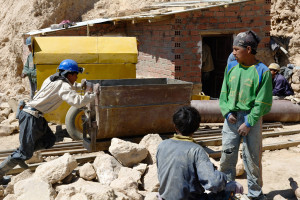Extraction in Peru Fuels Protests
About a year ago, Law 30151 went into effect in Peru, allowing the military and police to use lethal force against protestors. In a country where the use of lethal force seems to be accepted as a legitimate response to social protests in mining areas, the latest protests against oil extraction in the jungles of Peru warrant attention. Two Amazonian communities belonging to the Achuar indigenous group made demands to Pluspetrol, the largest oil and gas producer of Peru. The government already declared environmental emergency in several areas surrounding Pluspetrol’s lot in recent years by citing high levels of oil pollution and spills. Paralyzing production by closing down certain oil wells, both indigenous communities involved are demanding compensation for the company’s use and pollution of the land. It is important to note, however, that these recent protests are in no way an isolated case and in fact reflect a broader problem with Peru’s extraction policies.

One could argue that the economic history of Peru, ever since the days of the Spanish empire, is tied with mining. Today, mining in Peru has taken on a new form as technological advancements have allowed for large-scale extraction operations to take place. These operations require greater use and access to a variety of resources including land, water, and energy. While the extractive industry has proven to be an extremely important source of tax revenue for the Peruvian government, these operations have also greatly impacted the communities that occupy the worksites.
Both activists and local communities point out environmental concerns as the integrity of the water supply as well as agricultural lands have become jeopardized. In addition, many local communities are often forced to relocate away from prospective sites for mining and drilling. Perhaps of more concern, however, is a more fundamental principle: local communities are often left out of the decision-making process. For indigenous groups especially, this stands as a sensitive issue given the exploitative nature of interactions with indigenous peasants throughout history in the Americas. Consultation rights are often demanded by local stakeholders concerning extractive projects, while environmental concerns often accompany these demands for rights. The frequency of protests reflects a deep mistrust in resource extraction by the local communities.
Protest over mineral resources is in fact the most frequent source of protest in Peru. Where there are winners, there are losers, and while certain sectors have reaped the windfalls of lucrative extractive industries during the commodity boom, environmental and social costs have been great. Displacement, pollution, and deforestation are all legitimate concerns, and as reflected in the recent actions of the Achuar communities in Peru, protests serve as a platform to voice demands and concerns by those kept out of the decision-making process. Repression may come as the State’s reflex, but perhaps giving local stakeholders a say in the situation would be a better alternative.
Having copper ore and crude petroleum as its main exports, Peru’s economic prospects look bleak in the near future. Two decades of pro-mining policies and free trade agreements have indeed contributed to Peru’s impressive growth in recent years, but ignoring the exploitative aspects of these policies is problematic. Recent falls in commodity prices further complicate the situation. Peru is a nation state built up from resource extraction, but sustainability—both social and economic—is something policy-makers need to take seriously. Resource extraction brought wealth and opportunities, but the vices it brings affect the voiceless masses and could very well jeopardize the nation’s plans towards progress. Only time will tell if the Peruvian government will be able to reconcile the interests of the people with the nation’s economic growth strategy.
